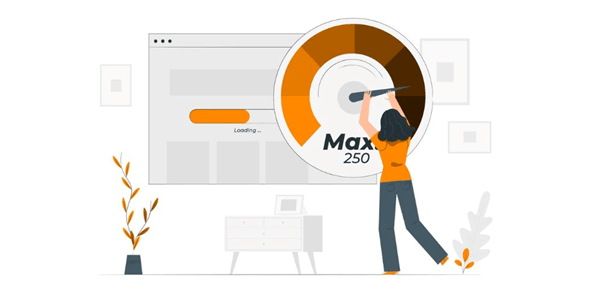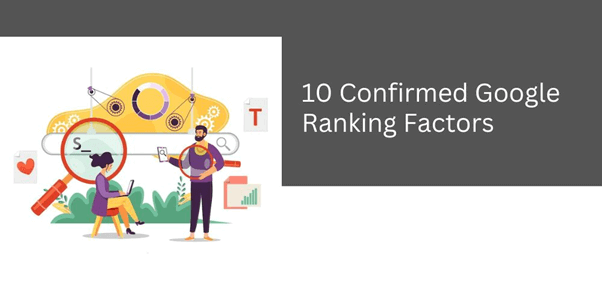Website evaluation is aided by the Google ranking factor, which determines the order in which search results should be shown. You need to know the factors Google considers when choosing your SEO service.
A number of ranking factors are used by Google to enhance user experiences, increase lead and conversion generation, and more. As part of this blog, we will examine the 10 confirmed Google ranking factors.
A Google ranking factor is just one of the numerous pieces of information that Google uses to assess how well a website responds to a specific search query.
In other words, Google will employ ranking factors to present users with the most probable beneficial items when they enter the “best WordPress theme” into their search engine.
In addition to giving users the best results for their searches and a satisfying online experience, Google wants to present users with the best content.

The top elements for ranking on Google are, in no particular order:
Contents
- High-Quality Content
- On-Page Optimization
- Real Information
- Mobile-Friendly
- Page Experience
- Domain Authority
- Backlink Matters
- Keyword Optimization
- Optimised Images
- Page Speed
The field of search engine optimization is ever-changing. For instance, Google frequently modifies the algorithm that determines when, when, and how to display a particular link with the overarching goal of presenting the most pertinent and trustworthy information.
Here are some factors that confirmed the google ranking factors of your websites.
1. High-Quality Content
The classic SEO proverb “content is king” may be familiar to you. Moreover, your content’s quality significantly impacts Google ranking variables.
Google will rank your content higher on its search engine results page if you can produce original, current, and helpful information for users (SERPs).
Your content’s quality is a significant factor for Google. If your content is not worthwhile, it doesn’t matter how well-optimised your website is—higher ranks are not what you should anticipate.
2. On-Page Optimization
To rank higher in search results, you must create content that matches the demands of your target audience because Google wants to offer searchers the most helpful sites for a specific query.
For content to be highly ranked, it must offer the user genuine value, have appealing aesthetics, and use keywords relevant to a search.
The primary technique for content optimization is the skillful use of keywords. Keep in mind that Google uses keywords to help your content line up with relevant search queries. To improve your rating, avoid stuffing your text with keywords.
3. Real Information
Google prioritises genuine information. You want to design websites that meet the demands of your audience, offer something new, and are original.
Your SEO will only improve if your content is not duplicated or excessively similar to that of other websites. Google might not even index a duplicate website in the worst-case scenario.
Additionally, if you frequently publish duplicate content, Google may decrease the frequency at which it crawls your page.
Make sure your content is unique and superior to other websites ranking for your desired search term when generating it. Of course, your target keywords should also match the search terms you wish to rank for.
4.Mobile Friendly
Nowadays, more individuals browse on their cell phones than on their computers, with approximately 60% of all searches taking place on mobile devices. As a result of this development, Google changed its ranking formula and introduced a mobile-first index.

Therefore, whether or not your page is mobile-friendly affects how it will rank for all queries, whether they are conducted from a desktop computer or a phone.
Smartphone users will not have a good experience on your pages if your website is not responsive.
Without the benefit of a larger screen, using a non-responsive website can be difficult and require continual zooming and scrolling. This increases the likelihood that visitors will leave in frustration, increasing your bounce rates and negatively affecting your search engine rankings. To gain traffic to your website, you should have a responsive web design.
5. Domain Authority
To sum up, the authority of your domain is also a crucial ranking factor. To appear on Google’s first page, it can help to have a highly respectable website or one that links to a reliable source.
Many would argue that the only option left regarding your domain’s age is to wait. That’s inaccurate, though, because you can take steps to make that history relevant.
It could be more challenging to recover and rank higher if your domain has a history of receiving Google penalties.
Google will probably penalise you for spammy practices if you employ an exact-match domain without applicable, pertinent content.
6. Backlink Matter
Links from one website to another that can be clicked on are called backlinks. Google advises building backlinks from other authoritative websites on the topic, yet no one is entirely sure what the ideal backlink should look like.
In Google’s search algorithm, backlinks are one of the most important ranking signals. Your chances of ranking well for competitive keywords increase with the number of links you have from various high-authority domains.
The Penguin 4.0 update, which cleans and filters websites with low-quality backlink profiles, has made it even more critical for online marketers to pay close attention to their backlink profiles.
7. Page Experience
As the latest changes to Page Experience have demonstrated, user experience (UX) affects SEO.
If UX isn’t considered, your website will go in the proverbial “garbage.” If a website’s content and design are ugly, a large number of people will cease interacting with it.
Getting this properly can provide significant advantages. You may witness an increase in page views by changing the content and improving the call-to-action buttons on your websites.
8. Keyword Optimization
The search terms people enter into search engines should correspond to the keywords. The meta title tag of your page must now contain the keywords it aims to rank for.
Including the keywords your page targets in its meta title tag have become crucial. Google evaluates the use of keywords in a website’s content and meta tags, including the frequency and placement of keywords, to determine the relevance of a website to a user’s search query.
Although any seasoned SEO marketer should be able to see this reality, keyword strategy is a demanding intellectual activity that can easily take 20 to 30 minutes per page.
It’s also vital to remember that a title tag’s placement and keyword density matter. In theory, your title tag should contain the keyword you’re trying to target, but in practice, adding articles and adjectives to the title tag is crucial for readability.
9. Optimised Images
Image optimization is essential for Google ranking because: It improves page load speed, which is a ranking factor.
Optimised images take up less storage space, which also helps with page speed. Properly labelled and descriptive photos can improve the accessibility and user experience of a website.
Properly optimised images can also provide more context and information to search engines, making it easier for them to understand the content of a page.
Make sure the images you want to rank for are unique. As previously mentioned, Google does not want to display duplicates. Pictures of your products at work, your customers, your services, or any other photo taken by the brand itself are the optimal images to choose from.
10. Page Speed
Page speed can refer to one of two things: 1) How long a web page displays all of its content entirely, and 2) how long it takes for a web server to send the first bits of data to a user’s browser.
Since Google seeks to enhance users’ web experiences and prioritises quick-loading web pages, page speed has been listed as one of the most crucial SEO ranking variables for years.
Google also ranks your page’s mobile load times because over half of all online traffic originates from mobile devices.

Making sure that your website is quick enough to not negatively affect your users is more important than how much faster it is than your competitors’ websites by a few milliseconds.
Conclusion
There are undoubtedly many more ranking signals, even though we’ve tried to include the most prevalent and significant Google Ranking Factors. However, if you first master these foundations, we promise that your organic search traffic and Google SEO rankings will significantly improve.
A website’s ranking on the top page of Google depends on SEO. Several companies provide advanced SEO services that have helped companies rank higher when online searchers look for their products and services.
We sincerely hope you enjoyed reading about the key elements of the Google Ranking Factor. The key is improving the user experience while simultaneously demonstrating to Google that you are the most qualified source for a user’s query rather than depending on a list of hot Google ranking factors or other tactics.
Google announced that it used more than 200 ranking variables in 2006. That’s undoubtedly the most comprehensive viewpoint, but to make it a little more tactical, I’ve compiled all of the known ranking elements .
Author Bio
Priya Pandey works as an SEO Specialist for Ultrabyte International Pvt. Ltd – An IT Company in Nepal. She is passionate about learning new things. Her positive attitude and tireless energy allow her to keep up with the latest news. When she is not working, she enjoys reading, exploring the beauties of nature, and eating delicious food.

